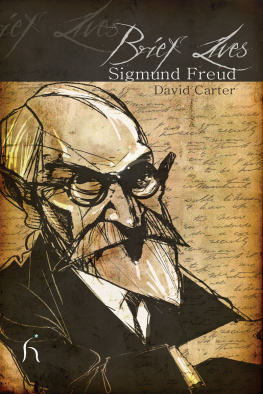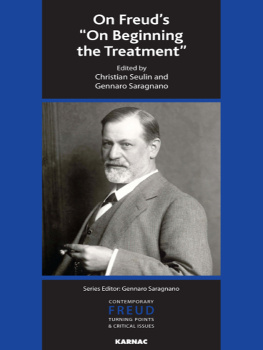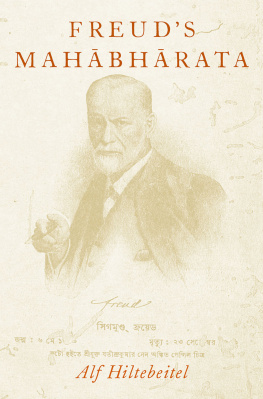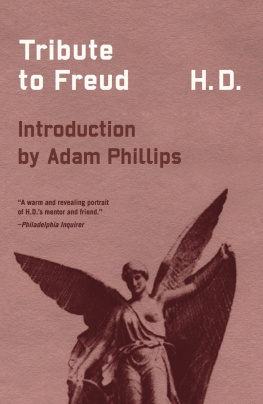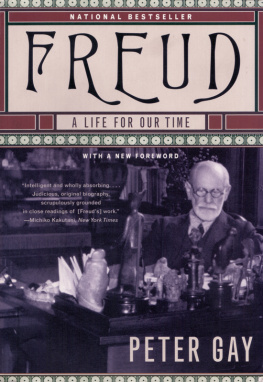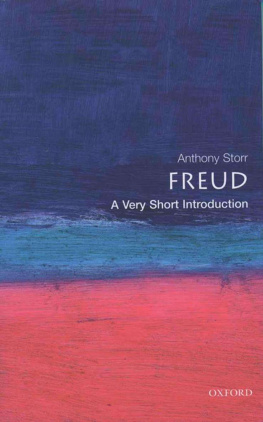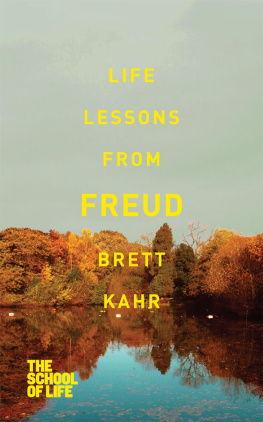Freud on Coke
Psychologists on Psychology
This edition first published in hardcover in the United States in 2012 by The Overlook Press, Peter Mayer Publishers, Inc.
141 Wooster Street
New York, NY 10012
www.overlookpress.com
For bulk and special sales, please contact sales@overlookny.com
Copyright 2009, 2012 by David Cohen
All rights reserved. No part of this publication may be reproduced or transmitted in any form or by any means, electronic or mechanical, including photocopy, recording, or any information storage and retrieval system now known or to be invented, without permission in writing from the publisher, except by a reviewer who wishes to quote brief passages in connection with a review written for inclusion in a magazine, newspaper, or broadcast.
ISBN 978-1-46830-677-4
This book is dedicated to two people. First, to Zoltan Gruber, my Austro-Hungarian uncle, who had to flee the Nazis. My boy, I always carry twenty thousand dollars in cash in my pockets in case the Gestapo come back, he once said to me. He survived the war and went to live in Paris. My uncle was no psychoanalyst but a very astute money smuggler. He was a survivor like Freud and would have understood many of the dilemmas the founder of psychoanalysis faced during the 1930s.
Second, to my dear son Reuben who taught me so much about Freud and writing about him.
States of conflict and turbulence alone can further our knowledge.
S IGMUND F REUD , An Outline of Psychoanalysis, 1940
In 1925 Edward Bernays wanted his uncle, Sigmund Freud, to write an autobiography. He had had, he said, a good offer from an American publisher. Bernays, too, was a pioneer. In the 1920s he was called the first public relations consultant, and he had an acute sense of how to influence public opinion.
What deprives all autobiographies of value is their tissue of lies, Freud shot back to his nephew. Lets just say parenthetically that your publisher shows American naivety in imagining that a man, honest until now, could stoop to so low for five thousand dollars. The temptation would begin at one hundred times that sum, but even then I would renounce it after half an hour.
Twelve years later Freuds friend Arnold Zweig, the Socialist writer, asked for his permission to write his biography. Freud was as fierce as before: Anyone who writes a biography is committed to lies, concealments, hypocrisy, flattering and even to hiding his own lack of understanding, for biographical truth does not exist and, if it did, we could not use it. He added a reference to his beloved Hamlet: Was the prince not right when he asks who would escape whipping were he used after his desert?
I have chosen to ignore my subjects obvious distrust of biographies, on the grounds that I concentrate on how Freud refused to leave Vienna after the Nazis annexed Austria until it became clear that it was far too dangerous to be at the mercy of the Gestapo.
The British version of this book was published January 2010. In June of that year I received a letter from Anna Freuds former secretary, Gina Le Bon. I went to see her in Zurich and to thank her for some new information included here.
Freuds discoveries did not only stem from analyzing his own dreams or treating his patients; he was possibly the first great artist-scientist to grow up in a now very familiar institution, the extended stepfamily. Modern psychologists speak of the blended or reconstituted family. Freud was born into just such a family and lived in one for most of his life. Those experiences helped shape his ideas to the end of his days.
details the letters and other material to which scholars still do not have access seventy years after Freud died.
Vienna, July 25, 1947
Anton Sauerwald looked very haggard for a man of forty-two. His doctor, Karl Szekely, had written many times to the court to explain that his patient was suffering from tuberculosis and asked that the proceedings be delayed. Sauerwald had spent a month in the hospital. However, Judge Schachermayr would have no more delays. The accuseds wife, Marianne, sat close to her husband. She had told the court that her husband had no secrets from her.
For most of the war Sauerwald had been an officer in the Luftwaffe, not a pilot but a technical expert. In March 1945 he was captured and sent to a prisoner of war camp at Bad Heilbrunn run by the Americans, but in June he was released and returned to Vienna. The Nazi defeat had shattered a long-treasured private dream. Throughout the war he had looked after fifteen allotments belonging to a group of Nazis who planned to build a small estate for like-minded people. Their slogan had been Miteinander Freinander (Together for Each Other), but that dream was now over.
Sauerwald was an extremely well-educated man. When he was only twenty-four years old, he had published four learned papers in the influential Monatsheft der Chemie (The Monthly Journal of Chemistry). He had a doctorate from the University of Vienna, where his professor was a distinguished organic chemist, Josef Herzig, who is still remembered for a particular reaction he discovered. Herzig was also a friend of Freuds and regularly visited him in the evening to play cards. Sauerwald always liked and respected Herr Professor Herzig.
Once in Vienna, a city in ruins and a city of betrayals, Sauerwald could not find his wife. Three months before the war ended, she had abandoned her factory job and fled west, not wanting to be captured by the Russians. Sauerwald spent a night at the house of his mother-in-law, Anna Talg, but in the confusion at that time, Anna did not know where her daughter was to be found. Sauerwald then went to his wifes grandmothers house in Kritzendorf, but his wife was not there, either. While Sauerwald was searching for her, someone else was looking for him. Harry Freud, Sigmunds nephew, was an officer in the American army and insisted that Sauerwald be tracked down. Harry Freud had excellent contacts: one of his cousins was Edward Bernays, who had worked for Woodrow Wilson, the president who took the United States into the First World War. Harry Freud believed that Sauerwald had robbed his family and destroyed the family business, the psychoanalytic publishing house that had started in 1919. He forced his way into the Sauerwalds old flat to seek documents that would prove the mans guilt. No one would stop an American officer.
A few days later, when Anna Talg was asked by the police to describe her son-in-law, she found it hard to say anything much about him. His nose was normal; his ears were normal; his mouth was normal. His eyes were blue-gray. He had absolutely no distinguishing characteristics apart from his blond hair.
At the end of October 1945, at Harry Freuds insistence, Sauerwald was arrested and the police started to investigate his past in detail. The archives of the city of Vienna make it possible to follow the police inquiries that led to Sauerwald being imprisoned, first in Gefaengnis 1 and then in Gefaengnis 2. He lost the flat on Witter-hauergasse, in Viennas Eighteenth District, where he and his wife had lived since the mid-1930s. He had to go to the civil courts to be allowed even to set foot inside his old home. The city had given his flat to a new tenant, Frau Leidersdor, and Sauerwald claimed she had robbed him of the contents of a wardrobe and chemicals, including gold and some catalysts, worth 50,000 reichsmarks.
Frau Leidersdor had a good grasp of publicity and told the press that she was being harassed by the man who had robbed Sigmund Freud. In 1946 the Vienna papers published two stories portraying Sauerwald as a vicious Nazi who was trying to boot a defenseless woman out of her home.




